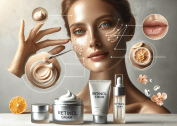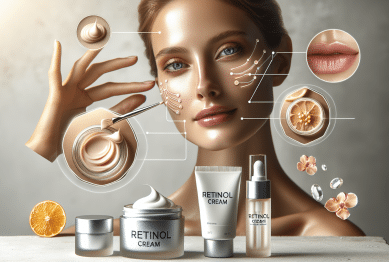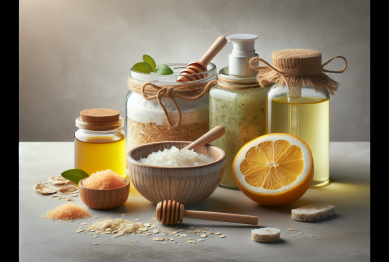Explore how you can support skin hydration through smart habits, daily routines, and evidence-based wellness strategies. This guide takes a fresh look at natural approaches for glowing, supple skin, from hydration-boosting foods to lifestyle tweaks and product choices—plus what dermatologists recommend for lasting skin health.
Understanding the Science of Skin Hydration
Skin hydration is more than a superficial concern—it’s essential for maintaining healthy, resilient skin. When the skin barrier is working well, it retains moisture and repels irritants. Researchers emphasize that natural moisturizing factors (NMFs), including amino acids and lipids, support this critical function. Without enough water, skin can feel rough, look dull, and become more susceptible to irritation and premature aging. An emphasis on skin hydration isn’t about vanity but supporting the skin’s ability to protect and repair itself. Daily exposure to wind, sun, and environmental pollutants can chip away at skin moisture, making replenishment an ongoing process that requires internal and external strategies. According to experts, even mild dehydration can decrease skin elasticity and accentuate lines, making hydration a foundational component of any holistic wellness and beauty regimen (https://www.ncbi.nlm.nih.gov/pmc/articles/PMC5843357/).
Dermatologists often highlight that the body’s hydration status—how much water you consume—directly influences the condition of your skin. However, drinking more water doesn’t always translate to perfectly hydrated skin. The outermost layer of the skin, called the stratum corneum, acts as a shield but is in constant exchange with the environment. Factors such as humidity, diet, stress, and skincare habits play interconnected roles. For people seeking a radiant, hydrated complexion, focusing on lifestyle choices is as important as what’s applied topically. Applied science has shown that combining humectants with emollients and occlusives leads to improved moisture retention over time, and these approaches align with trends in holistic aesthetics (https://www.aad.org/public/everyday-care/skin-care-basics/dry/keep-skin-hydrated).
Genuine skin hydration takes a multifaceted strategy, involving both product selection and habits that support skin health from the inside out. Skin naturally loses water through a process called transepidermal water loss (TEWL), which increases with age, environmental exposure, and use of harsh cleansers. For many, understanding this science leads to practical steps: choosing cleansers without sulfates, applying moisturizers within minutes after bathing, and keeping an eye on diet and overall water intake. Building awareness of how hydration affects your complexion will inform smarter beauty purchases and lifestyle adjustments, contributing to sustained skin health and comfort.
Daily Habits That Boost Skin Hydration
Starting with gentle routines sets a firm foundation for skin hydration. Cleansing the face with lukewarm water and fragrance-free products helps maintain natural oils, which form the skin’s protective barrier. Experts note that over-cleansing or using harsh soaps can strip these essential oils, leading to dryness and increased water loss. Adding a hydrating serum with ingredients such as hyaluronic acid or glycerin directly after cleansing, followed by a nourishing moisturizer, helps trap moisture before it can evaporate. These straightforward practices build a habit of skin hydration through consistent, gentle care. Layering products from thinnest to thickest can optimize absorption—making it easier for skin to stay dewy and supple (https://dermnetnz.org/topics/skin-barrier-function).
Avoiding long, hot showers is another smart lifestyle change for those seeking to improve skin hydration. Hot water may feel relaxing, but it strips away protective fats, leaving skin more vulnerable. Limiting shower time and using a moisturizing body wash can make a noticeable difference for overall skin feel and appearance. Additionally, using a humidifier at home, particularly during colder months, adds moisture to indoor air and reduces skin dryness. Following up bathing with a rich cream or oil while skin is still damp acts as a practical sealant. These small tweaks, combined with conscious hydration, offer cumulative long-term benefits for various skin types and ages.
The effects of stress on skin hydration are often underestimated. High cortisol levels can disrupt the natural barrier, leading to dryness or flare-ups. Incorporating stress-management practices such as meditation or yoga, as well as prioritizing restful sleep, has been shown to benefit both mind and skin. Nighttime routines that emphasize calm, such as applying a gentle occlusive balm before bed, further help lock in moisture while the body’s repair mechanisms work overnight. By aligning your habits with your skin’s natural circadian rhythms, you can support deeper, more effective hydration outcomes.
Choosing Effective Hydration-Boosting Ingredients
The cosmetics market offers a wide range of moisturizing ingredients—and not all are equally hydrating. Hyaluronic acid has become a buzzword for good reason: it can hold up to 1000 times its weight in water, drawing moisture into the upper layers of the skin. Glycerin, another popular humectant, helps by attracting and holding onto water molecules from the environment. When these are combined with emollients (like squalane or ceramides) that fill gaps in the skin’s surface and occlusives (such as petrolatum or natural oils), the result is a strong, multi-layered skin barrier. Dermatologists agree that such combinations improve hydration and make the skin look smoother. Reading product labels—looking for formulas that balance humectants with emollients—helps target dryness more efficiently (https://www.fda.gov/cosmetics/cosmetic-ingredients/how-find-ingredient-list-cosmetics).
Ceramides, natural fats found in the outer layer of the skin, are often recommended for sensitive or mature skin. These lipid molecules help reinforce the skin’s natural barrier, which can become depleted with age or environmental exposure. Products with ceramides are especially helpful after exfoliation or during changes in weather. Meanwhile, botanical oils such as jojoba, almond, and sunflower seed provide emollient benefits without clogging pores. Each ingredient offers a different kind of hydration: some attract water, some lock it in, and others smooth the skin’s surface. Layering these in mindful ways supports optimal barrier function in the long term.
Fragrance-free and non-comedogenic options offer the most gentle hydration for reactive skin types. Adding a targeted boost with overnight hydration masks or ampoules allows for deep replenishing effects, especially in dry climates or for those with frequent travel. For many, trial and observation become keys: slight adjustments in ingredients or application can make a significant change in how skin feels and looks. Consulting trusted sources or dermatologists for ingredient education supports safer, more resilient skin over time, which is a cornerstone of healthy self-care.
Foods and Drinks That Promote Hydrated Skin
Hydrating the skin doesn’t come from creams alone—internal choices are equally important. Nutrition plays a key role, with water-rich foods such as cucumbers, lettuce, cantaloupe, and berries providing an easy way to increase hydration. Omega-3 fatty acids, found in fatty fish like salmon or in chia and flax seeds, support the lipid layer that helps prevent water loss. Antioxidant-rich fruits and vegetables, including tomatoes, oranges, and avocados, assist in counteracting environmental damage and help maintain plump, elastic skin. According to registered dietitians, maintaining adequate fluid and nutrient intake works synergistically with topical regimens for best results (https://www.hsph.harvard.edu/nutritionsource/water).
Proper hydration extends to what you drink, and it doesn’t have to stop at water. Herbal teas, such as chamomile and rooibos, offer additional hydration with anti-inflammatory benefits. Limiting beverages that act as diuretics, like caffeinated coffee or sugary sodas, can prevent excess water loss from the skin. For those who exercise frequently, using electrolyte-enhanced water or unsweetened coconut water helps replace fluids lost through sweat. Listening to thirst cues and drinking before feeling parched can help promote steady hydration for the whole body, supporting overall wellness from within.
Alcohol is known to dehydrate the skin, so moderation is key for anyone wanting to maximize skin moisture. Balancing occasional beverages with plenty of water and nutrient-rich snacks can help counteract dry skin effects. In climates with extreme temperatures, carrying a refillable water bottle and eating hydrating foods throughout the day makes maintaining skin hydration more manageable. As part of a comprehensive approach, these dietary habits offer benefits for both wellness and beauty—making healthy skin a delicious reward.
Addressing Seasonal and Environmental Challenges
Seasonal changes can dramatically affect how the skin retains moisture. Cold weather and low indoor humidity—especially with artificial heating—can strip skin of its natural oils, intensifying dryness and flaking. Conversely, hot, humid weather may increase sweat and oil production, sometimes leading to dehydration if not managed properly. Adapting your skincare regimen to the season—such as switching to a richer moisturizer in winter—optimizes hydration year-round. For individuals who spend a lot of time outdoors, using a broad-spectrum sunscreen daily supports the skin barrier while minimizing moisture loss due to sun exposure (https://www.niams.nih.gov/health-topics/skin-care).
Air pollution also plays a direct role in skin hydration. Fine particles and chemical pollutants can disrupt the barrier and accelerate water loss, so regular gentle cleansing and occasional use of antioxidant-rich serums are recommended. For city dwellers, wearing a scarf or wide-brimmed hat offers extra protection on high-pollution days. Simple changes, like increasing the use of indoor plants or air purifiers, can help improve air quality within the home. Recognizing environmental contributors helps you make small adjustments for more hydrated, comfortable skin regardless of your surroundings.
Travel presents unique hydration challenges, especially with frequent flying or changes in altitude. Carrying a travel-sized hydration mist and a rich moisturizer for use during flights can prevent the characteristic dullness associated with air travel. Applying a thick occlusive balm to lips, the corners of the nose, and hands further guards against dehydration in transit. Because every environment is different, tuning your routine to match your needs in each setting gives your skin the best chance of staying soft, supple, and well-hydrated wherever you go.
Working With Dermatologists for Personalized Hydration
When persistent dryness, irritation, or flaking occurs despite careful routine adjustments, it’s wise to consult a board-certified dermatologist. These professionals can help identify underlying conditions, such as eczema or psoriasis, that require targeted treatments rather than a simple hydration boost. Personalized advice may include prescription emollients, barrier repair creams, or recommendations for patch testing to pinpoint ingredient sensitivities. Clinical input gives users a tailored plan that aligns with their skin’s needs, helping avoid frustration and unnecessary product experimentation (https://www.aad.org/public/diseases/a-z/eczema).
Regular check-ins with a skincare professional offer other benefits, too. Assessing the effectiveness of your current products, discussing medical history, and even reviewing nutrition and lifestyle choices allow for more nuanced hydration strategies. Some dermatologists also offer treatments like professional-grade hydration facials or microneedling, which can stimulate collagen production and help skin maintain moisture balance. These adjunct services can boost the results of your homecare efforts and reveal new options for advanced hydration.
Staying aware of your skin’s shifting needs as you age or encounter new health situations is crucial. Customized routines, built with a specialist’s input, mean you can adapt proactively—whether you need to address hormonal changes, environmental shifts, or new product sensitivities. This harmonious collaboration between professional advice and daily savvy forms the foundation for healthy, glowing, hydrated skin at any age.
References
1. Loden, M. (2017). The clinical benefit of moisturizers. https://www.ncbi.nlm.nih.gov/pmc/articles/PMC5843357/
2. American Academy of Dermatology Association. (2023). How to help your skin retain moisture. https://www.aad.org/public/everyday-care/skin-care-basics/dry/keep-skin-hydrated
3. DermNet NZ. (2022). Skin barrier function. https://dermnetnz.org/topics/skin-barrier-function
4. Harvard T.H. Chan School of Public Health. (2023). The Nutrition Source: Water. https://www.hsph.harvard.edu/nutritionsource/water
5. National Institute of Arthritis and Musculoskeletal and Skin Diseases. (2021). Skin Care. https://www.niams.nih.gov/health-topics/skin-care
6. U.S. Food and Drug Administration. (2020). How to Find an Ingredient List for Cosmetics. https://www.fda.gov/cosmetics/cosmetic-ingredients/how-find-ingredient-list-cosmetics









